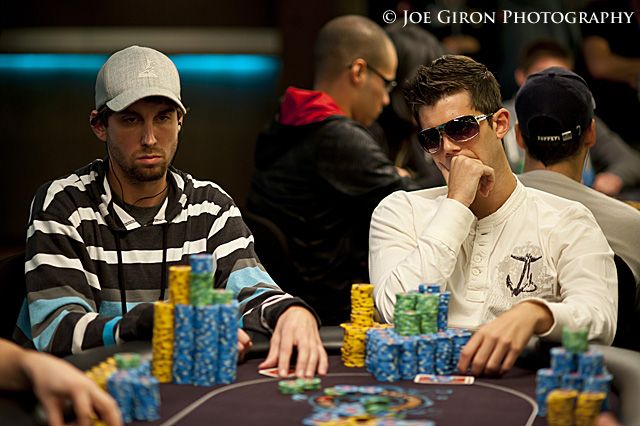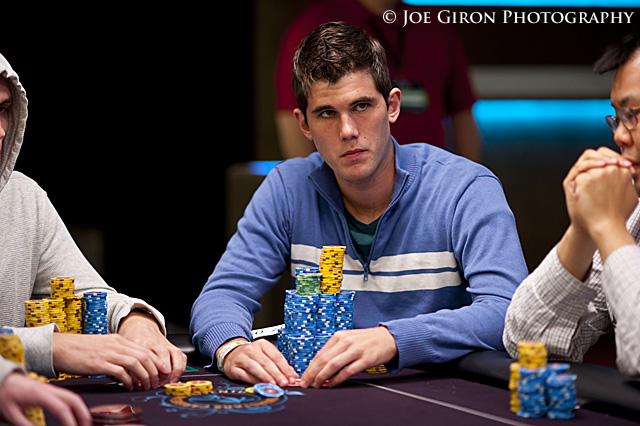
I constantly work with clients who tell me they are running bad when they are actually playing poorly.
How do I know they are playing poorly? I review their hands. They give me hand histories from their online play. I make them write down every hand they play live. What we analyze isn’t pretty.
If you want to make a grown man cry show him all the ways he lost money in a particular session. With database management tools, you can show the person their expected losses based on their plays.
Do you think you have been running badly lately?
It’s possible that you are running badly, but what is far more likely is that you are playing badly somewhere.
The following five leaks are the most common ways people destroy their results. If you are committing any of these errors, then you are likely playing badly as opposed to running bad.
Cold Calling Too Much
Do not cold call someone’s open raise from the small blind, hijack, lojack, or early position without astounding pot odds and an incredible suited high-card hand.
If you can do that you will avoid a huge trap most players fall into.
Go look at your cold calls on your hand history analysis tool. Oftentimes, you will see losses racking up.
The most common places people lose money with cold calls are in the small blind and any position earlier than the cutoff.
The reason for this is that by cold calling preflop you immediately tell your opponents that you do not have the best hands in your range. You would have three-bet your premiums. This gives them a license to fire into you.
Additionally, if someone is three-betting behind you and you are not calling them then you are giving up a ton of chips every time that happens. For instance, you call four 2.5x raises and then fold to squeezes that are 10 big blinds. That might be your win rate for 100 hands. I don’t know how many hands you’re going to play in a day, but that is a serious bite taken out of your earnings.
Continuation Betting Too Much
Almost all players who complain that they are running badly are also continuation betting too much.
There are times when you cannot continuation-bet. If you do so in these situations, you are just pissing away three or four big blinds. If you do three bad continuation-bets in a session that’s another 10 or so big blinds you’ve given to your competition. Again, that might be your entire win rate for 100 hands. How many hands are you playing today?
When the big blind calls you that is a good time to continuation-bet. They are calling you with half the hands in the deck. They are going to be missing the flop a large percentage of the time. You can take a shot at that player when you’re in position.
However, if you raise from early position and a solid player cold calls you from the hijack you need to be careful. That solid player is not cold-calling with a wide range. That’s likely strong suited connectors, suited Broadways, and medium pocket pairs. They are going to be hitting most flops. Your best course of action is to check and then fold.
Most players do not find the opportunities to fold. If you are folding in situations where your competition is losing chips, then you will beat them as the years go by.
When you go to the grocery store the clerk doesn’t know where your money came from. They will still hand you your bread and bananas if the money came from not pissing away continuation bets and cold calls. The money all spends the same.

Firing The Turn Recklessly
Most of my clients are like most of you. They play lower to middle stakes games where nobody wants to fold and where nobody respects your raises.
In lower-limit games or less-skilled games, most people want to see the flop. That is how they relieve stress. That is how they forget about their day at work. They call raises and see flops. When those cards are being spread across the table, they feel nothing. They’re not thinking about anything that is bothering them.
For this reason, most lower-level competition sees too many flops. When they miss the flop, their curiosity is satiated. They will call with their best high cards but generally they fold if they miss. Especially in multi-way pots.
What this means is that if you fire a continuation-bet into the flop and get called your opponent likely has at least a pair. If the turn card is not a card that would fold out a pair, you should pump the brakes.
It’s not sexy. It’s not going to get you on any highlight reels. It doesn’t feel great. But such is life when you are playing against weaker competition. You have to meet reality on reality’s terms and accept that your opponents do not want to fold once they’ve made up their mind with a decent pair.
Not Threebetting Enough
When you sit down at a table you should be watching everybody play. A showdown is a mountain of information.
Let’s say you saw a player open the ![]()
![]() from early position.
from early position.
For the rest of the session, you better be three-betting your ![]()
![]() and
and ![]()
![]() versus his opens for value.
versus his opens for value.
You might do this in earlier positions than you would like, but this player opened up this play. If he calls out of position and makes a weak pair, you will be dominating him. You need to go for serious value at this point.
One of the most important skills you can develop in no-limit hold’em is a good three-betting game. You don’t want your opponents to keep stealing your late-position raises. You don’t want your opponents to keep forcing you to fold good hands or play them passively. You want to three-bet them and dominate.
I don’t have enough space in this article to discuss all the different ways you can three-bet your opponents and become table captain. So, if you want to learn how to dominate any table, I’m going to give you this master class of mine for free. Learn how to three-bet everybody here.

Not Value Betting Enough
“I can’t beat these donkeys. They never fold,” my client says to start the lesson.
45 minutes later a hand comes up. My client has top pair with a great kicker. A flush draw on the board misses. My client bets half pot.
“Why did you bet half pot there?” I ask.
“I think I have the best hand,” they say, “I want him to call.”
“Why don’t you overbet?” I ask. “Why not bet 110% of the pot and represent the missed flush draw?”
“I don’t want them to fold,” my client says.
“So you overbet here when you miss the board right? As a bluff? Because they fold?”
“No, they never fold,” my client says.
I let the answer hang in the air for a minute.
“You can’t have it both ways,” I tell them. “This is either an occasion where we can bet huge for value or it’s a spot to bluff. Why not at least bet 80% of the pot?”
The biggest mistake players make is they try to play perfectly all the time. They are terrified about value betting thinly and then getting raised. They don’t care that they don’t get raised more than 90% of the time. The 10% of the time they have to fold a good hand makes them feel terrible about themselves.
This is not a neat game. This is not a perfect game. This is a messy game. There’s a reason people like to play poker in backrooms while drinking whiskey. It’s supposed to be a mess.
You can either try to be perfect all the time or you can get primal. You can start looking to land overbet bombs or you can be stuck in your shell forever.
The people in your games never fold right?
When was the last time you triple barreled a second pair with top kicker?
When was the last time you triple barreled a weak top pair?
When was the last time you three-bet a mediocre hand to get serious value out of it?
If your opponents never fold you should be able to do all of these things.
Go look at your hand histories. Filter for triple barrels. Filter for three-bets. See what you find.
About Alex Fitzgerald
Alex Fitzgerald is a professional poker player and best-selling author who currently lives in Denver, Colorado. He is a WPT and EPT final tablist. He has WCOOP and SCOOP wins online. His most recent win was for $250,000 online. He currently enjoys blasting bums away in online tournaments while he listens to death metal.
Alex can be reached for private coaching at [email protected]
Learn how to three bet everybody here!

